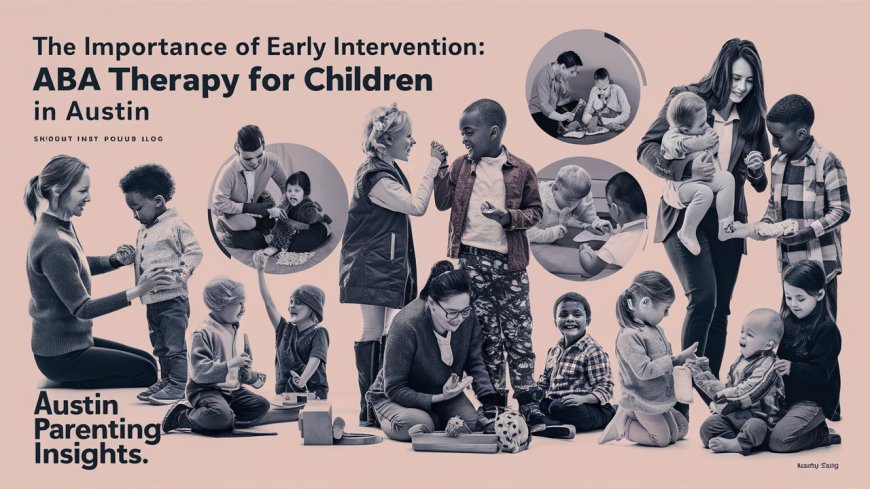The Importance of Early Intervention: ABA Therapy for Children in Austin
Discover how early ABA therapy in Austin supports children's development, promoting essential skills for a brighter future.

Early intervention through Applied Behavior Analysis (ABA) therapy has emerged as a cornerstone in supporting children with autism spectrum disorder (ASD) in Austin, Texas. For families navigating the challenging journey of autism diagnosis, understanding the profound impact of early ABA intervention can make a significant difference in their child's developmental trajectory and future success.
Early Intervention in ABA Therapy
Early intervention refers to identifying and addressing developmental challenges as soon as possible in a child's life. Research consistently shows that children who begin ABA therapy before age five often demonstrate remarkable progress in communication, social skills, and cognitive development.
The Science Behind Early Intervention
The human brain exhibits extraordinary plasticity during the first few years of life, making this period optimal for intervention and learning. During these formative years, children's brains are particularly receptive to environmental influences and learning experiences. This heightened neuroplasticity creates an ideal window for implementing ABA therapy strategies.
Benefits of Early ABA Intervention
Developmental Progress
Children receiving early ABA intervention often show significant improvements across multiple developmental domains:
-
Enhanced communication abilities and language skills
-
Improved social interaction and relationship-building
-
Better cognitive functioning and problem-solving capabilities
-
Increased adaptive skills and self-help abilities
-
Reduced challenging behaviors and improved emotional regulation
Long-term Advantages
Research demonstrates that early ABA intervention can lead to substantial long-term benefits for children with autism. Studies have shown that children who receive intensive early intervention often require less support in later years and demonstrate better outcomes in educational and social settings.
Components of Effective ABA Therapy in Austin
Comprehensive Assessment and Planning
ABA Therapy Austin Texas journey begins with a thorough assessment of the child’s current skills, challenges, and needs. Board Certified Behavior Analysts (BCBAs) in Austin work closely with families to develop individualized treatment plans that address specific areas of concern while building on existing strengths.
Skill Development Focus Areas
|
Skill Category |
Examples |
Benefits |
|
Communication |
Verbal expression, sign language, alternative communication systems |
Enhanced ability to express needs and interact with others |
|
Social Skills |
Turn-taking, sharing, conversation skills, play skills |
Improved peer relationships and social integration |
|
Daily Living |
Self-care, hygiene, basic life skills |
Increased independence and self-sufficiency |
|
Academic Readiness |
Following instructions, basic concepts, pre-academic skills |
Better preparation for educational settings |
|
Behavioral Management |
Coping strategies, emotional regulation, appropriate responses |
Reduced challenging behaviors and improved adaptation |
Parent and Family Involvement
Successful ABA therapy Austin programs emphasize the importance of family participation. Parents and caregivers receive training and support to implement ABA strategies in daily life, creating consistency across environments and maximizing therapeutic benefits.
Selecting ABA Services in Austin
Quality Indicators
When choosing ABA services in Austin, Texas, families should look for programs that demonstrate:
-
Board Certified Behavior Analyst (BCBA) supervision
-
Individualized treatment planning
-
Regular progress monitoring and data collection
-
Family-centered approach
-
Evidence-based intervention strategies
Treatment Settings
ABA therapy Austin TX offers various treatment settings to meet different needs:
Center-Based Programs: Structured environments specifically designed for ABA therapy, offering opportunities for peer interaction and skill generalization.
Home-Based Services: Therapy is provided in the familiar environment of the home, allowing for the natural implementation of strategies in daily routines.
Community Integration: Programs that incorporate community settings to help children apply learned skills in real-world situations.
Implementation Strategies
Creating Supportive Environments
Successful early intervention requires creating environments that promote learning and development. Austin ABA providers work with families to establish:
-
Structured daily routines that support learning
-
Clear communication systems
-
Positive reinforcement strategies
-
Consistent behavior management approaches
-
Opportunities for skill practice and generalization
Progress Monitoring
Regular assessment and data collection help track progress and adjust intervention strategies as needed. Austin ABA providers typically:
-
Monitor skill acquisition across domains
-
Track behavior frequency and patterns
-
Assess generalization of skills
-
Evaluate treatment effectiveness
-
Adjust programs based on progress data
Overcoming Common Challenges
Early Identification
One significant challenge in early intervention is identifying autism spectrum disorder in young children. Austin healthcare providers recommend regular developmental screenings and encourage parents to act on early concerns. Warning signs that may indicate the need for evaluation include:
-
Limited or no eye contact for 6 months
-
Absence of babbling by 12 months
-
Limited or no words by 16 months
-
Limited or no meaningful two-word phrases by 24 months
-
Any loss of previously acquired speech or babbling
-
Limited interest in social interactions
Access to Services
Finding and accessing quality ABA services in Austin can present challenges for some families. However, various resources and support systems are available:
-
Insurance coverage for ABA therapy
-
Early Childhood Intervention (ECI) programs
-
State-funded support services
-
Private therapy options
-
Parent support groups and resources
The Role of Early Intervention in School Readiness
Academic Preparation
Early ABA intervention plays a crucial role in preparing children for educational settings. Through structured learning experiences and skill development, children develop foundational skills necessary for academic success:
-
Pre-academic concepts
-
Classroom behavior skills
-
Group participation abilities
-
Following instructions
-
Basic academic readiness skills
Social Integration
Early intervention helps children develop social skills essential for school success. Through ABA therapy, children learn:
-
Appropriate peer interaction
-
Group participation skills
-
Following classroom routines
-
Emotional regulation in social settings
-
Communication with teachers and peers
Making the Most of Early Intervention
Consistency Across Settings
Maximizing the benefits of early intervention requires consistency across different environments. Austin ABA providers work with families to ensure:
-
Regular therapy sessions
-
Consistent implementation of strategies
-
Communication between all caregivers
-
Integration of skills across settings
-
Regular progress monitoring and adjustment
Conclusion
Early intervention through ABA therapy represents a crucial opportunity for children with autism in Austin to develop essential skills and reach their full potential. The evidence supporting early intervention is compelling, and the availability of quality ABA services in Austin provides families with the resources they need to support their children's development effectively.
Illuminate ABA Therapy stands as a leading provider of Applied Behavior Analysis therapy in Austin, Texas. With a dedicated team of Board Certified Behavior Analysts and trained therapists, we deliver comprehensive, evidence-based interventions tailored to each child's unique needs.
What's Your Reaction?


























